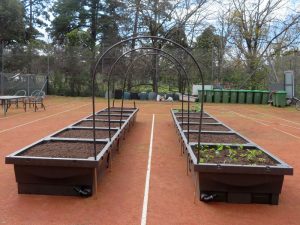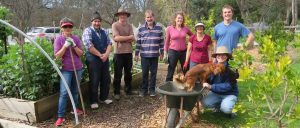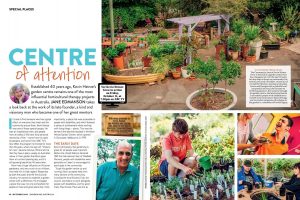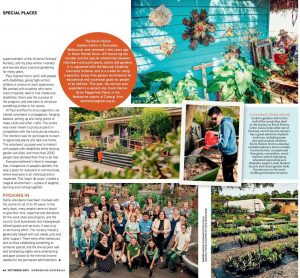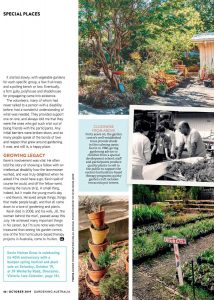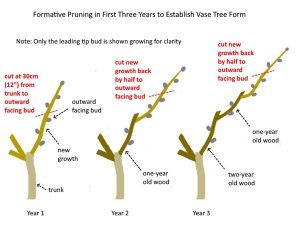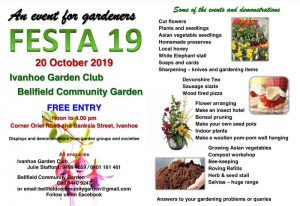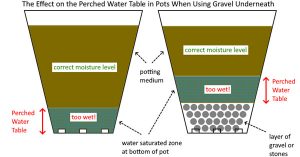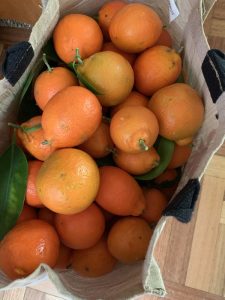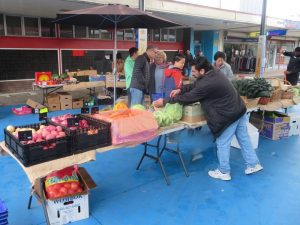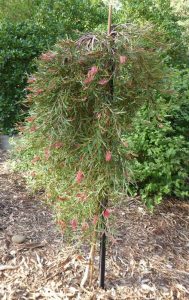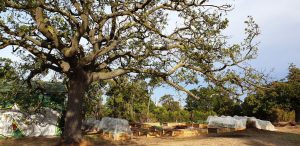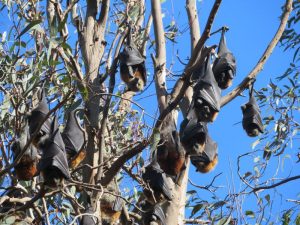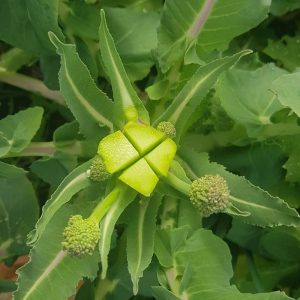Ann visits the garden of Zofia Di Stefano in Mount Waverley
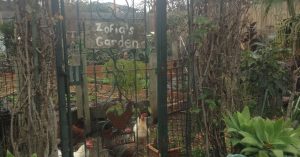 As Ann Stanley discusses in her write up, Zofia’s garden has many facets: a garden with links to the past (Zofia’s parents were Polish migrants); a garden that produces food (veggie patch, herb bed and fruit trees); a garden that makes art of hard rubbish (ceramics, parasols and lanterns); a garden that builds fertility from organic waste (compost bins and worm farms); and a garden that has roots and branches in the community (contributors, volunteers and neighbours). Here’s an example quote that caught my eye: “Zofia, like me, is a lover of hard rubbish, and Waverley Council still has a special day on which every household can put their unwanted items on the nature strip for collection. Zofia’s daughter calls it a hard rubbish festival and it is – I’ve gleaned from it with my own hands! … If you have any moral reservations about gleaning and salvaging, there is much reading you can do which elevates it to the level of high moral, aesthetic and even religious practice. See this article that links the practice of gleaning to ‘slow looking’.” Read Ann’s full write up.
As Ann Stanley discusses in her write up, Zofia’s garden has many facets: a garden with links to the past (Zofia’s parents were Polish migrants); a garden that produces food (veggie patch, herb bed and fruit trees); a garden that makes art of hard rubbish (ceramics, parasols and lanterns); a garden that builds fertility from organic waste (compost bins and worm farms); and a garden that has roots and branches in the community (contributors, volunteers and neighbours). Here’s an example quote that caught my eye: “Zofia, like me, is a lover of hard rubbish, and Waverley Council still has a special day on which every household can put their unwanted items on the nature strip for collection. Zofia’s daughter calls it a hard rubbish festival and it is – I’ve gleaned from it with my own hands! … If you have any moral reservations about gleaning and salvaging, there is much reading you can do which elevates it to the level of high moral, aesthetic and even religious practice. See this article that links the practice of gleaning to ‘slow looking’.” Read Ann’s full write up.
Robin’s tip of the month – mulch crisis!
With the drought has come high prices for organic mulch, that indispensable item for the home gardener. Pea straw and sugar cane mulch have risen steadily over the past few years and are now the most expensive they have ever been. What are we to do? Mulch is important for several reasons. Most importantly, it stops the soil surface drying out and retains moisture in the soil. It also prevents weeds growing and seed germinating, and adds organic material to the soil, improving its health and aeration. It insulates the soil, keeping the soil temperature consistent. And it prevents compaction caused by heavy rain.
There are many materials that can be used for mulching. Some are suitable for the veggie garden which generally needs a pH of 6-7, some for trees, and some for acid-loving plants requiring a pH of 5.5 or below:
- Pea straw is high in nitrogen, significantly improves soil microbiology and provides excellent worm food. Spread it 4-10cm deep on new beds and 2-4cm if refreshing beds previously mulched.
- Sugar cane mulch has a low pH and should be mixed with some dolomite to balance it. It is quite fine and can mat, providing a bedding for creeping weeds such as chickweed but, as it breaks down rapidly, it does benefit the soil microbiology quickly. It is more expensive in the long run than pea straw because of its rapid decomposition. Spread it to a depth of between 4-10cm.
- Fruit trees do well with wood chip. At this time of year, pull back any mulch to the dripline of the tree and ring the dripline with 6-8cm width and height of woodchip. This encourages fungi, plus worms which take the mulch underground and shred it, thus creating a soil food web.
- Acid-loving plants, such as blueberries and passionfruit, require an acid mulch. Pine needles when aged are suitable but, when unaged, contain terpenes, which are chemicals that are toxic to many plants. Cedar chips also contain these.
- Kelp seaweed is my favourite mulch but unfortunately is almost impossible to get, and it is illegal to collect it from beaches. It provides sodium, boron (which soils in our area are deficient in) and other trace elements plus nitrogen and potash.
- Growing a green manure crop is a cheap and quick form of mulching. Once matured, cut the plants at ground level and spread them. Leave the roots in and they will provide runnels for water to enter the soil.
Other readily available mulches – often free – include grass clippings, leaves and coffee grounds and husks. All must be applied very lightly as they can mat and also produce an unpleasant odour.
- Grass, which will add nitrogen as it breaks down, should be dried and spread thinly. Avoid grass clippings with dog faeces and lawns that have been sprayed with pesticides to kill weeds. As a green material, grass clippings will support soil bacteria.
- Leaves break down slowly and, to prevent matting, they need to be spread very thinly. If green, they support bacteria; if brown, fungi.
- Coffee husks by themselves are a disaster turning into a heavy, rancorous mat but with coffee grounds rubbed through them by hand – a somewhat tedious job – they are usable and will improve the soil.
- Wood shavings and sawdust rob the soil of nitrogen (good for keeping paths weed free for that reason) and should be avoided, though they can be added to the compost bay.
Macleod Organic Community Garden has free wood chip mulch from Banyule City Council. Turn up at the garden with bags, tubs or trailers on Wednesdays or Saturdays between 1pm and 4pm and take as much as you like. Bring a fork or spade! Read more of Robin Gale-Baker’s tips.
Guy replies to reader questions
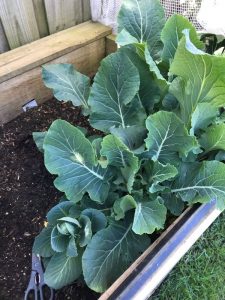 Stephen Brennan has written in: “All of my cauliflowers look like this. Heaps of leaves but no white cauliflower. What is wrong?” Here’s my reply: “Cauliflowers are quite prone to not developing heads. It is usually a sign of stress but that stress can be of different types including: inconsistent moisture; weather that is too warm; or a lack of nutrients. I think you’re now too late to do anything about it this year – try again next year, and make sure you read this article about growing cauliflowers on our website.” If you have any questions, feel free to email me with them. Either I’ll answer them or I’ll pass them on to a higher authority (such as Robin Gale-Baker).
Stephen Brennan has written in: “All of my cauliflowers look like this. Heaps of leaves but no white cauliflower. What is wrong?” Here’s my reply: “Cauliflowers are quite prone to not developing heads. It is usually a sign of stress but that stress can be of different types including: inconsistent moisture; weather that is too warm; or a lack of nutrients. I think you’re now too late to do anything about it this year – try again next year, and make sure you read this article about growing cauliflowers on our website.” If you have any questions, feel free to email me with them. Either I’ll answer them or I’ll pass them on to a higher authority (such as Robin Gale-Baker).
Got any room for any more fruit trees?
Telopea Mtn Permaculture & Nursery (aka Pete the Permie) will be making their last appearance of the season at next Sunday’s Eltham Farmers’ Market (i.e. on 29th September) to sell their bare-rooted fruit trees. As a special, they will be selling their dwarf 2 metre size apricots, peaches and nectarines at a 33% discount.
Want to swap food for trade services?
Neil Jamieson is a licensed plumber, gasfitter and drainer. He also welds and repairs things. He wants to swap these trade services for good quality food. Contact Neil by phone (0419 331560) or email.
Want to job?
Moreland Community Gardening are looking for a Community Gardening Coordinator to facilitate the development and coordination of our community gardens. The role will involve running community events, helping to evaluate the effectiveness of their gardens, and working towards their vision of a Moreland where everyone can grow food, garden and build connected communities. 5 hours per week, $50 per hours, fixed term contract until December 2020. Closing date: Friday, 27th September. Read more and apply.
What seeds to plant in October
Here is a list (see the planting guide for more detail):
CucurbitsCucumber |
Other warm season veggiesBeans |
Leafy greensLettuce |
RootsBeetroot |
Other veggiesAsparagus |
Compared with September, the solanums (capsicum, chilli, eggplant and tomato), basil and coriander drop out of the list, whilst the cucurbits (cucumber, gourd, pumpkin, rockmelon, watermelon and zucchini) stay in. Note, however, that these lists are the months that it is ideal to plant particular seeds and that you can sometimes plant in other months. So, for example, if your tomato seeds didn’t germinate in September, it’s better to try again in October (or buy some seedlings) rather than face the prospect of no homegrown tomatoes. Helen Simpson has previously written ‘how to grow’ articles about many of the warm season veggies, namely: basil, chilli, cucurbits and tomatoes. Robin Gale-Baker has previously written about how to grow eggplants and capsicums. And Helen has written more generally about Spring veggie garden preparation.
Not food but interesting
Yarra Valley Plant Fair & Garden Expo. Saturday, 26th October and Sunday, 27th October, both 10am-5pm. Plant displays, demonstrations and talks, with special guests Jane Edmanson and Phillip Johnson. Entry fee: $12. Romantic Nursery, 125 Quayle Road, Wandin. Succulents and cacti show. Saturday, 26th October, 10am-5pm and Sunday, 27th October, 10am-3pm. Entry fee: $7. Mount Waverley Community Centre.
Which link was clicked most times in the last newsletter?
Judy’s visit to St Johns Riverside Community Garden.
Proverb of the month
Take with a pinch of salt. Meaning: accept something while maintaining a degree of scepticism about its truth. In 77 AD, Pliny The Elder published a recipe for a poison antidote which can be translated as “Take two dried walnuts, two figs, and twenty leaves of rue; pound them all together, with the addition of a grain of salt.” The suggestion is that a grain of salt can ameliorate the injurious effects of consuming poisons. Or, less starkly, that some food is more palatable if seasoned with salt. The figurative meaning, applying the phrase to truth, didn’t enter the language until much later, namely the 20th Century, where ‘pinch of salt’ also became a variant. The New Food Lover’s Companion apparently considers a pinch to be 1/16 of a teaspoon, while a dash is “somewhere between 1/16 and a scant 1/8 of a teaspoon“. The Traditional Oven website says that a grain of salt in cooking is 1/88 of a teaspoon. So, there are around 5.5 grains in a pinch, and somewhere between 1 and 2 pinches in a dash. Read more proverbs.
Gardening quote of the month
“A society grows great when old men plant trees whose shade they know they shall never sit in.” An anonymous ancient Greek person. Read more quotes.
Joke of the week
Submitted by Vince Rozmiarek: I call my horse mayo and sometimes mayo neighs. Read more jokes.
New events – not cooking
Spring in the veggie garden – preparing for your Summer harvest: Wednesday, 2nd October, 7-8.30pm; Kilsyth.
What: Listen to tips on how to prepare your garden for spring and receive a bumper harvest over Summer and Autumn. You will learn about what you can plant, how to care for your soil and plants over summer, and how to use water wisely. Cost: free. Bookings: EventBrite.
Green at Kathleen – summer veggie garden success: Tuesday, 8th October, 3.30-5pm; Kathleen Syme Library.
What: They will talk through the tips and tricks to plant your patch and keep it thriving through the warmer months, including advice about individual crops such as tomatoes, eggplants, cucumbers, zucchinis and capsicums. They will cover taking plants from seeds all the way up to getting the most out of your harvest. Cost: free. Bookings: EventBrite.
Chocolate and cheese pairing event: Wednesday, 9th October, 7-8.30pm; Ratio Cocoa Roasters, Brunswick.
What: Start with an indulgent hot chocolate on arrival, followed by matching four artisan cheeses with four single origin chocolates. This masterclass will open your palate to new combinations and tastes. Hosted by Matt Steele, from Cornelius Cheesemongers and Debb Makin, from Ratio Cocoa Roasters. Cost: $47. Bookings: EventBrite.
Rushall Community Garden open day: Saturday, 12th October, 11am-1.30pm; Rushall Community Garden, Fitzroy North.
What: Go and learn about community gardening and meet gardeners engaged in active gardening. This event will feature: cakes, jams & preserves; seedlings & fresh garden produce; gardening books; raffles; composting demonstrations; and BBQ & refreshments. Click here to read about the garden. Cost: free. Bookings: just turn up.
Australian native food harvest: Saturday, 12th October, 2-3.30pm; Lilydale Library.
What: Julie Weatherhead, from Peppermint Ridge Farm, will present an ‘aromatic’ talk on native food plants for the home gardener. Learn which plants grow best in your garden, how to propagate them, and how to use these plants in the home kitchen. Cost: free. Bookings: their website.
Sustainable gardening course (8 sessions): starting Monday, 14th October, 10am-2pm; Fawkner Food Bowls.
What: Learn how to grow your own organic fruit, herbs and vegetables. Join CERES horticulturist Lizzie Bickmore as she teaches the skills and knowledge to confidently propagate seedlings, save seeds and grow vegetables. Cost: $490 full; $65 ACFE. Bookings: by phone (0449 694711) or email.
Knowing and growing great tomatoes: Wednesday, 23rd October, 7-8.30pm; Montrose.
What: Penny Woodward will share her knowledge on the many varieties of heirloom tomatoes available to gardeners, and tips on how to ensure you get a bumper tomato crop this summer. Cost: free. Bookings: EventBrite.
Bees wax wraps: Thursday, 31st October, 10am-midday; Mount Evelyn.
What: Holly from Holly’s Backyard Bees will show you how to make bees wax wraps and will have a selection of Christmas fabrics for you to choose from. Cost: $50. Bookings: by phone (9736 1177).
Open Table Spring fundraising feast: Thursday, 7th November, 6.30-9pm; North Fitzroy Library.
What: Join Open Table for their first fundraising feast. Enjoy a three course vegetarian dinner prepared and served by their dedicated team. There will be a silent auction and the opportunity to learn more about Open Table’s story from Reground’s Kaitlin Reid. Open Table “take surplus food that would otherwise be thrown away, and turn it into nutritious meals to share with the community, in order to reduce food insecurity and food waste“. Cost: $49. Bookings: EventBrite.
Green at Kathleen – beekeeping 101 and build your own native bee hotel: Wednesday, 13th November, 5.30-7pm; Kathleen Syme Library.
What: They will cover keeping honey bees in urban Melbourne, how to help the bees even if you don’t keep them, and how to build a native bee hotel. Re keeping bees, they will talk about the time and cost commitment, as well as what you can expect from your hive. Re supporting bees, they will discuss what to plant to attract these essential pollinators. Re bee hotels, there will be some materials and equipment for you to construct your own simple bee hotel for the backyard. Cost: free. Bookings: EventBrite.
Edible native plants for small gardens: Monday, 18th November, 7-8pm; Coburg Library.
What: Facilitated by Karen Sutherland. Find out what local plants you can grow and how to use them. Select appropriate plants for your space, such as lemon myrtle or desert lime, and create safe habitats for local fauna. Cost: free. Bookings: EventBrite.
New events – cooking
Miso paste making: Saturday, 12th October, 11am-1.30pm; Preston.
What: Miso is a traditional Japanese seasoning produced by fermenting soybeans with salt and koji (the fungus Aspergillus oryzae). You will learn about different types of miso, taste various miso dishes, make rice miso and learn how to use miso in you daily cooking. Cost: $95. Bookings: by email (hello.cookingwithkoji@gmail.com).
Nuka zuke – rice bran pickling: Sunday, 13th October, 11am-1pm; Preston.
What: Nuka zuke is a famous Japanese fermented pickling technique using rice bran. In this workshop, you will make your own Nuka medium/bedding so that you can keep pickling at home for years and years! Cost: $95. Bookings: by email (hello.cookingwithkoji@gmail.com).
Sourdough bread making workshop: Saturday, 19th October, 10am-1pm; Living & Learning, Panton Hill.
What: Tutor Jenna Farrington-Sear. This workshop will cover basic theory as well as the tactile pleasure of all the steps of making bread from milled flour. Suitable for both novices and those who want to expand their bread making repertoire. Topics to be covered: the essential ingredients and tools of the trade; the principal steps of bread making; Baker’s percentage and hydration; mixing, kneading and folding dough; shaping loaves, scoring and baking; and maintaining a starter. You will take home: a piece of dough which can be baked at home; and a sourdough starter. Cost: $58. Bookings: their website.
Truffle workshop at Ratio Cocoa Roasters: Saturday, 19th October, 10.30am-midday; Ratio Cocoa Roasters, Brunswick.
What: A behind-the-scenes tour of the 10 step chocolate making process at Ratio Cocoa Roasters. Followed by a guided chocolate tasting. Then make your own milk or dark truffles with a selection of toppings. Cost: $75. Bookings: EventBrite.
Truffle workshop at Ratio Cocoa Roasters: Saturday, 9th November, 10.30am-midday; Ratio Cocoa Roasters, Brunswick.
What: A behind-the-scenes tour of the 10 step chocolate making process at Ratio Cocoa Roasters. Followed by a guided chocolate tasting. Then make your own milk or dark truffles with a selection of toppings. Cost: $75. Bookings: EventBrite.
Summary of upcoming events – not cooking
Over the next week
- Compost: Wednesday, 25th September, 8-10pm; Preston.
- Tomato talk, book sales & signing: Thursday, 26th September, 7-8pm; Brunswick.
- Native plants for food and medicine: Saturday, 28th September, 9.30am-12.30pm; Bulleen Art and Garden.
- Growing your veggies from seed: Saturday, 28th September, 2-3pm; Watsonia Library.
- Spring in the veggie garden – preparing for your Summer harvest: Wednesday, 2nd October, 7-8.30pm; Kilsyth.
Over the next month
- Eating for energy masterclass: Thursday, 3rd October, 6.30-8pm; Chirnside Park Community Hub.
- Just Eat It (film): Thursday, 3rd October, 6.30-8.30pm; Preston.
- Growing great tomatoes: Saturday, 5th October, 10am-3pm; CERES, Brunswick East.
- Book launch – Plotting at Rushall Community Garden: Saturday, 5th October, 2-4pm; North Fitzroy Library.
- Growing mushrooms in your home and garden (2 day): Saturday, 5th October and Sunday, 6 October, both 9am-4.30pm; Bellfield Community Garden.
- Citrus care workshop: Sunday, 6th October, 2-5pm; Sylvester Hive, Preston.
- Native pollinators: Monday, 7th October, 7.30-9pm; Nunawading Civic Centre.
- Green at Kathleen – summer veggie garden success: Tuesday, 8th October, 3.30-5pm; Kathleen Syme Library.
- Am I hungry? Mindful eating program (8 sessions): 8 consecutive Tuesdays, starting 8th October, 7-8.30pm; Heidelberg Heights.
- Macleod Organic Community Garden tour and talk: Wednesday, 9th October, 2-3.30pm; Macleod Organic Community Garden.
- Mental Health Week – food for every mood: Wednesday, 9th October, 6-9pm; Kathleen Syme Library, Carlton.
- Chocolate and cheese pairing event: Wednesday, 9th October, 7-8.30pm; Ratio Cocoa Roasters, Brunswick.
- 2040, Join the Regeneration (film): Wednesday, 9th October, 7-8.30pm; Hoyts, Greensborough.
- Herbal teas: Thursday, 10th October, 6.30-9pm; Bulleen Art and Garden.
- Edible weeds walk: Saturday, 12th October, 10.30am-12.30pm; Brunswick East.
- Rushall Community Garden open day: Saturday, 12th October, 11am-1.30pm; Rushall Community Garden, Fitzroy North.
- The art of watering: Saturday, 12th October, 12.30-2pm; Bellfield Community Garden.
- Edible weeds walk: Saturday, 12th October, 1.30-3.30pm; Brunswick East.
- Australian native food harvest: Saturday, 12th October, 2-3.30pm; Lilydale Library.
- Urban chickens 101: Saturday, 12th October, 2-4pm; Central Ringwood Community Centre.
- Set up and maintain a worm farm: Saturday, 12th October, 3-4pm; Edendale.
- Knox Community Gardens 35th birthday celebration: Sunday, 13th October, 9am-4pm; Boronia.
- Bee hive tour: Sunday, 13th October, 10.30am-12.30pm; Yarrambat.
- Sustainable gardening course (8 sessions): starting Monday, 14th October, 10am-2pm; Fawkner Food Bowls.
- Vegetable seedling propagation: Thursday, 17th October, 6.30-8.30pm; Edendale.
- Produce in pots: Thursday, 17th October, 6.30-9pm; Bulleen Art and Garden.
- Introduction to permaculture and urban agriculture (6 sessions): 6 consecutive Fridays, starting 18th October, 10am-2pm; Richmond.
- Kevin Heinze GROW 40th Anniversary Spring Festival: Saturday, 19th October, 9am-3pm; Kevin Heinze GROW, Doncaster.
- Herb and companion planting with Carol Henderson: Saturday, 19th October, 10am-3pm; CERES, Brunswick East.
- Home brewing with Paul Rigby: Saturday, 19th October, 10am-3pm; CERES, Brunswick East.
- Bee hive tour: Saturday, 19th October, 10.30am-12.30pm; Yarrambat.
- Open Cellars of the Artisan Hills: Saturday, 19th October, 11am-5pm; various around Nillumbik.
- Home composting workshop: Saturday, 19th October, 2-4.30pm; Edendale.
- Beekeeping workshop: Saturday, 19th October, 2-4.30pm; Bee Sustainable, Brunswick East.
- Getting a harvest – Summer vegetables: Sunday, 20th October, 9-11am; Camberwell.
- Organic gardening for beginners: Sunday, 20th October, 10am-5pm; Edendale.
- Open Cellars of the Artisan Hills: Sunday, 20th October, 11am-5pm; various around Nillumbik.
- Getting a harvest – Summer vegetables: Sunday, 20th October, midday-2pm; Camberwell.
- Bellfield Community Garden Festa 19: Sunday, 20th October, midday-4pm; Bellfield Community Garden.
- Backyard beekeeping: Monday, 21st October, 6-7pm; Coburg Library.
- Beeswax wraps: Tuesday, 22nd October, 10-11.30am; Box Hill South.
- Worm farms and composting systems: Tuesday, 22nd October, 7-9pm; Manningham Civic Centre.
- Knowing and growing great tomatoes: Wednesday, 23rd October, 7-8.30pm; Montrose.
- Permaculture: Wednesday, 23rd October, 8-10pm; Preston.
- Growing tomatoes organically: Thursday, 24th October, 6.30-9pm; Bulleen Art and Garden.
Summary of upcoming events – cooking
Over the next week
- Cooking master class – ‘foodie favourites of 2019’: Wednesday, 25th September, 7-9pm; Gourmet Living, Templestowe.
- Cook Indian by the creek: Friday, 27th September, 6.30-8.30pm; Diamond Creek.
- Lunchbox made easy in the Thermomix: Monday, 30th September, midday-2pm; Chirnside Park.
Over the next month
- One meal many ways: Thursday, 3rd October, 10-11am; healthAbility, Eltham.
- Kids in the kitchen: Friday, 4th October, 10.30am-1.30pm; Panton Hill.
- Cook Indian by the creek: Friday, 4th October, 6.30-8pm; Diamond Creek.
- All about cakes with Emelia Jackson ‘floral Spring style’: Friday, 4th October, 7-9pm; Gourmet Living, Templestowe.
- No Waste Cook Club: Saturday, 5th October, 10am-midday; North Fitzroy Library.
- Cook and feast with Audra Morrice: Saturday, 5th October, 11am-12.30pm; Kitchen Warehouse, Preston.
- Farewell Victoria – vegan cooking class party: Sunday, 6th October, midday-4pm; Smiths Gully.
- Thermomix eat well – demonstration-style cooking class: Tuesday, 8th October, 6.30-8.30pm; Eltham.
- Cake decorating (6 sessions): 6 consecutive Tuesdays, starting 8th October, 7-9.30pm; Mitcham.
- Cooking master class – ‘festive faves’: Thursday, 10th October, 7-9pm; Gourmet Living, Templestowe.
- Cooking master class – ‘festive faves’: Friday, 11th October, 7-9pm; Gourmet Living, Templestowe.
- Mozzarella and ricotta cheesemaking workshop: Saturday, 12th October, 9-11.30am; Bee Sustainable, Brunswick East.
- Fermentation veg ferments and cultured condiments: Saturday, 12th October, 10am-2pm; CERES, Brunswick East.
- Creative Chinese vegetarian cooking: Saturday, 12th October, 10.30am-midday; Watsonia Library.
- Miso paste making: Saturday, 12th October, 11am-1.30pm; Preston.
- Ombre cake decorating workshop: Saturday, 12th October, 1-3pm; Chirnside Park Community Hub.
- Seasonal ferments: kimchi + kombucha: Saturday, 12th October, 2-4.30pm; Bee Sustainable, Brunswick East.
- Nuka zuke – rice bran pickling: Sunday, 13th October, 11am-1pm; Preston.
- Diabetes and diet: Tuesday, 15th October, 7-8.30pm; Hawthorn Community House.
- Christmas hamper cooking: Tuesday, 15th October, 7.30-9pm; Kilsyth.
- Cooking master class – ‘festive faves’: Wednesday, 16th October, 7-9pm; Gourmet Living, Templestowe.
- Artisan pasta with seasonal herbs: Thursday, 17th October, 11am-midday; Diamond Valley Library.
- Demystifying bread: Thursday, 17th October, 6.30-9pm; Park Orchards.
- Cooking master class – ‘festive faves’: Thursday, 17th October, 7-9pm; Gourmet Living, Templestowe.
- Punjabi vegetarian food (N.W. India) with Taariq Hassan: Saturday, 19th October, 10am-midday; Lower Templestowe.
- Sourdough bread making workshop: Saturday, 19th October, 10am-1pm; Living & Learning, Panton Hill.
- Truffle workshop at Ratio Cocoa Roasters: Saturday, 19th October, 10.30am-midday; Ratio Cocoa Roasters, Brunswick.
- Pickling with Dayle: Saturday, 19th October, 2-4pm; Central Ringwood Community Centre.
- Vegan cooking Italian style: Sunday, 20th October, 10am-3pm; CERES, Brunswick East.
- Cooking master class – ‘BBQ salads’: Thursday, 24th October, 7-9pm; Gourmet Living, Templestowe.
- Cooking master class – ‘BBQ salads’: Friday, 25th October, 7-9pm; Gourmet Living, Templestowe.

